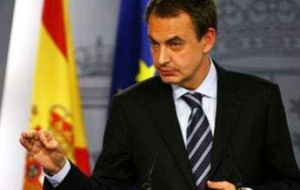MercoPress. South Atlantic News Agency
Madrid summit committed to a “multi-polar” world; rejects protectionism
 Spanish Prime Minister Jose Luis Rodriguez Zapatero, host of the summit
Spanish Prime Minister Jose Luis Rodriguez Zapatero, host of the summit The European Union-Latin America-Caribbean leaders’ summit wrapped up on Tuesday in Madrid with unanimous agreement about the need to develop new instruments of global governance for a multi-polar world and a commitment “to reject any form of protectionism”.
The event brought together the heads of state and government of 60 countries in a conference dominated by the international economic crisis and the decision to move toward a strategic partnership that will help to combine efforts to encourage development and recovery.
Argentine President Cristina Kirchner emphasized as the event’s main conclusion the confirmation that multilateralism is the “most suitable method to deal with not only financial problems, but also those of the political order”.
“There was unanimity in understanding that multilateral entities date from the post-war (era) and from a world that today doesn’t exist any more,” she said.
Along the same lines, Spanish Prime Minister Jose Luis Rodriguez Zapatero said that at the meeting “we established that changing the financial model is indispensable”.
“We will be more sovereign if we cooperate more among ourselves each day; we will obtain more freedom and development for our peoples if we open our borders without fear and with justice, if we understand that the development and inequalities of one country affect all countries in the international community,” he said.
“We are committed to reject any form of protectionism” said the summit leaders in the final declaration. “We want to favour a multilateral open and non discriminatory trade system, based on rules” and which helps “to promote recovery from the economic crisis” plus “growth and development”.
Regarding the Doha Round talks to further liberalize world trade, currently stalled, the EU/Latam summit reiterated its commitment to “a quick, ambitious and balanced conclusion”.
The 60 countries represented at the Madrid summit have a combined population of more than 1 billion and account for half of the G-20, an organization of both rich and developing nations that is meant to take the lead in addressing the global economic crisis.
The president of the European Council, Herman van Rompuy, said that the European Union and Latin America and the Caribbean must “do what is necessary” so that the great potential of their relationship may make itself felt.
He said that this group “will continue to remain below its potential if the two parties do not involve themselves on the political level. We must take advantage of the opportunities to convert ourselves into true strategic partners in a globalized world.”
The Latin American governments insisted that European countries should not close their doors to immigrants.
“We are seeing with much concern the discriminatory way that in different countries, particularly the most developed, are dealing with immigrants”, said Mrs Kirchner adding that “discriminatory practices and legislation against immigrants must be rejected”.
The Madrid Summit ended with the adoption of a roadmap for the development of the strategic partnership, the launching of the Eurolat foundation and the approval of a new fund, provided initially with 125 million Euros to support infrastructure projects in Latin America.
Within the framework of the summit, the participants agreed to resume talks between the EU and Mercosur – Argentina, Brazil, Paraguay and Uruguay – on a trade accord, in the context of an association and cooperation agreement, an effort that has been bogged down since 2004.
In addition, the participants concluded an Association Accord with Central America, and on Wednesday a trade pact with Peru and Colombia will be signed.
The European and Latin American leaders also renewed their commitment to solidarity with Haiti after the Jan. 12 earthquake that left more than 200,000 dead and some 1.5 million people homeless.




Top Comments
Disclaimer & comment rulesCommenting for this story is now closed.
If you have a Facebook account, become a fan and comment on our Facebook Page!